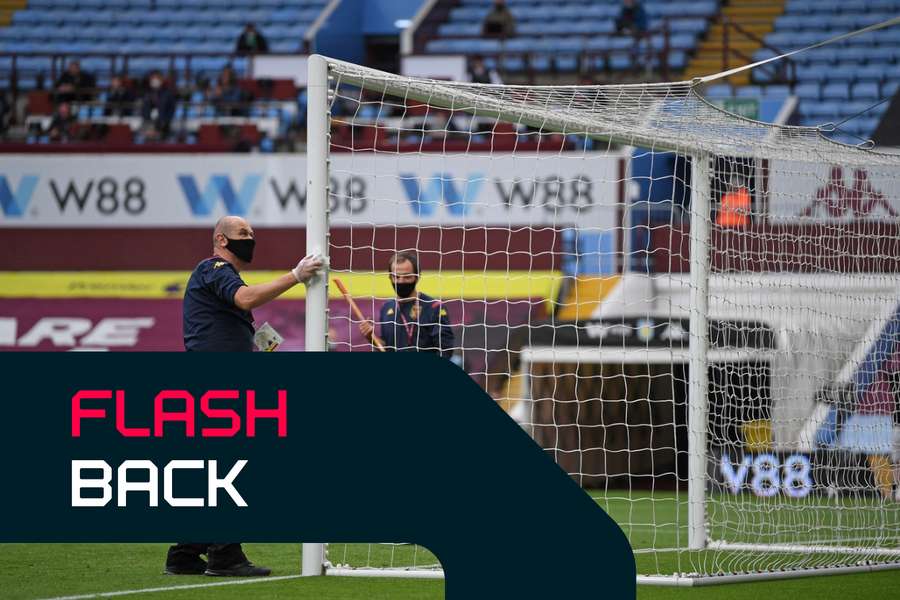But on June 17, 2020, after 100 days of silence, top-flight English football made its long-awaited return. It was a surreal sight: stadiums without fans, players observing strict health protocols, regularly tested, and even match balls disinfected before and during play.
Coaches' shouts echoed across the empty stands, goal celebrations were subdued, and substitutions were made with masks and caution.
It wasn’t the football that fans remembered, but it was a powerful sign of resilience, a moment that reminded fans everywhere that even in the darkest times, the game finds a way to go on.
'Game Zero': How one football match sparked a pandemic spread
Before we revisit the moment of a football post-pandemic return, we have to go back to when everything stopped. In early 2020, the world was just beginning to grasp the scale of the COVID-19 pandemic.
Borders were still open, stadiums were full, and life continued with a sense of uneasy normalcy. But in hindsight, one football match became a chilling symbol of how quickly things could unravel.
On February 19, 2020, Atalanta faced Valencia in the first leg of their UEFA Champions League Round of 16 tie. The match was played at San Siro in Milan, as Atalanta's home stadium did not meet UEFA requirements.
What should have been a historic and joyful night for Atalanta – their first-ever appearance in the Champions League knockout stage – would soon gain a much darker reputation.
With over 40,000 fans, most of them from the Bergamo area, travelling to Milan and celebrating together in the stands, on buses, in bars, and on trains, the match created the perfect conditions for the virus to spread.
At the time, COVID-19 was only beginning to be recognised as a serious threat in Europe. No one wore masks, and no restrictions were in place.
In the weeks following the match, Bergamo became one of the hardest-hit cities in Europe during the first wave of the pandemic. Hospitals were overwhelmed, and the death toll rose rapidly.
Medical experts and local officials began to suspect that the Atalanta vs. Valencia match had acted as a major super-spreader event.
The Italian media soon started referring to it as "Partita Zero", or "Game Zero" in English, symbolizing the point at which the virus may have exploded into the wider population through a single sporting event.
Some Spanish players and staff from Valencia also tested positive after the second leg, adding to the evidence.
How COVID-19 brought football to a halt
When COVID-19 began spreading rapidly, football, like nearly every aspect of daily life, came to an abrupt stop. Leagues across the world suspended their matches, stadiums emptied, and training grounds closed.
From Europe’s biggest leagues like the Premier League, LaLiga, Serie A, and Bundesliga to smaller domestic competitions everywhere, the game ground to a halt.
The suspension wasn’t limited to one country or region; football paused globally as governments imposed lockdowns and public health measures to control the virus. International tournaments, including the Champions League, were postponed.
However, there were a few exceptions. Notably, the Belarusian Premier League continued playing throughout the early months of the pandemic, attracting international attention as one of the very few top-flight leagues still active when most others were shut down.
The return of football: Premier League restart and summer showdowns
After a break lasting more than three months, football finally began to return in June 2020. The English Premier League was among the first major leagues to resume, with matches restarting on June 17, 2020.
The game looked very different with the empty stadiums, but the return brought a sense of hope and normalcy to millions.
Just weeks later, Europe’s top club competitions staged a dramatic and unprecedented conclusion. Both the UEFA Champions League and the Europa League resumed in August 2020 after being suspended in March.
To reduce travel and ensure safety, UEFA organised the remainder of the tournaments in single-leg knockout mini-tournaments. The Champions League’s Final Eight took place entirely in Lisbon, Portugal, while the Europa League’s decisive matches were held in four venues in Germany (Cologne, Dusseldorf, Duisburg, and Gelsenkirchen).
This compressed, high-stakes format produced thrilling encounters and unexpected results, ultimately crowning new champions amid the shadow of the pandemic.
The 2020 summer tournaments symbolised football’s resilience and adaptability - a sport determined to carry on even in the face of a global crisis.

